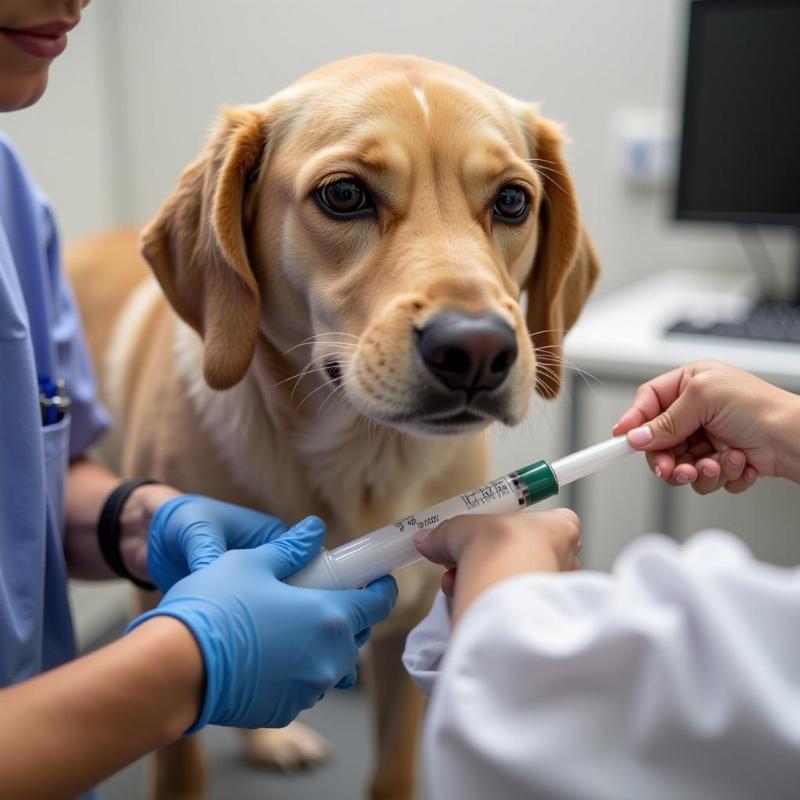Elevated cystatin B in dogs can be a concerning finding, often indicating potential kidney issues. Understanding what cystatin B is, why it’s measured, and what elevated levels mean is crucial for any dog owner facing this diagnosis. This article will delve into the significance of elevated cystatin B, exploring its connection to kidney function, diagnostic procedures, and potential treatment options in the United States.
Cystatin B is a protein produced by all nucleated cells at a constant rate. Because it’s freely filtered by the kidneys and not reabsorbed, it serves as a valuable marker for glomerular filtration rate (GFR), a key indicator of kidney function. When the kidneys aren’t functioning optimally, cystatin B levels in the bloodstream rise. Therefore, an elevated cystatin B level often signals a decrease in GFR and potential kidney disease.
What Causes Elevated Cystatin B in Dogs?
Various factors can contribute to elevated cystatin B levels in dogs. These include:
- Chronic Kidney Disease (CKD): This is the most common cause, as damaged kidneys are less efficient at filtering cystatin B.
- Acute Kidney Injury (AKI): A sudden decline in kidney function can also lead to elevated cystatin B.
- Hyperthyroidism: An overactive thyroid gland can sometimes influence cystatin B levels.
- Certain Medications: Some medications can impact kidney function and thus cystatin B.
- Dehydration: This can temporarily affect kidney filtration and lead to slightly elevated levels.
Diagnosing Elevated Cystatin B and Related Kidney Issues
Veterinarians in the US typically utilize a blood test to measure cystatin B levels. This test is often part of a comprehensive kidney profile, including other markers like creatinine and blood urea nitrogen (BUN). Interpreting these results requires a holistic approach, considering the dog’s overall health, age, breed, and other clinical signs. Further diagnostic tests like urinalysis, ultrasound, or even a kidney biopsy might be necessary to determine the underlying cause and severity of the kidney issue.
 Elevated Cystatin B Blood Test in Dogs
Elevated Cystatin B Blood Test in Dogs
Treatment Options and Management Strategies for Dogs with Elevated Cystatin B
Treatment for elevated cystatin B depends entirely on the underlying cause. If chronic kidney disease is diagnosed, management strategies often focus on slowing disease progression, supporting kidney function, and managing associated symptoms. This may involve dietary modifications, medications to control blood pressure and reduce proteinuria, and fluid therapy to address dehydration. In cases of acute kidney injury, intensive care and supportive treatments are crucial to restore kidney function.
Understanding the Prognosis for Dogs with Elevated Cystatin B
The prognosis for dogs with elevated cystatin B varies greatly depending on the underlying cause and the severity of the kidney dysfunction. Early detection and intervention are key to improving outcomes. Regular veterinary checkups and blood work, especially for senior dogs or those with predisposing factors, are crucial for early diagnosis and management of kidney issues.
How Can I Help My Dog with Elevated Cystatin B?
Working closely with your veterinarian is the most important step. Follow their recommendations regarding diet, medications, and follow-up appointments diligently. Provide a comfortable and stress-free environment for your dog, ensuring access to fresh water at all times. Regular monitoring of your dog’s overall health, appetite, and water intake can help you detect any changes early on.
FAQ: Elevated Cystatin B in Dogs
- What is a normal cystatin B level in dogs? Normal values can vary slightly between laboratories, but generally fall below 2.0 mg/L.
- Is elevated cystatin B always a sign of kidney disease? While it’s a strong indicator, other factors can sometimes influence cystatin B levels. A comprehensive veterinary evaluation is crucial for accurate diagnosis.
- Can diet affect cystatin B levels? Yes, a kidney-friendly diet can help manage kidney disease and may positively influence cystatin B levels.
- How often should my dog with kidney disease have its cystatin B levels checked? Your veterinarian will recommend the appropriate monitoring schedule based on your dog’s individual needs.
- Are there any home remedies for elevated cystatin B? While supportive care at home is essential, there are no home remedies that can cure or treat the underlying cause of elevated cystatin B. Always follow your veterinarian’s recommendations.
- What are the signs of kidney disease in dogs? Increased thirst and urination, decreased appetite, weight loss, vomiting, and lethargy are some common signs.
- Is elevated cystatin B painful for dogs? The elevated cystatin B itself is not painful, but the underlying kidney disease can cause discomfort and other symptoms.
Conclusion
Elevated cystatin B in dogs warrants immediate veterinary attention. Understanding its significance and connection to kidney health is crucial for responsible dog owners. Working closely with your veterinarian, following recommended treatment plans, and providing supportive care can greatly impact your dog’s quality of life and potentially slow the progression of any underlying kidney disease.
Beautdogs.us is your premier resource for comprehensive dog care information, breed-specific insights, and product recommendations. We are dedicated to providing both new and experienced dog owners with authoritative and engaging content to ensure the well-being of their beloved canine companions. For expert advice and further assistance, contact us at [email protected] or call us at +1 501-555-7529. Beautdogs.us is your trusted partner in providing the best possible care for your furry friend.